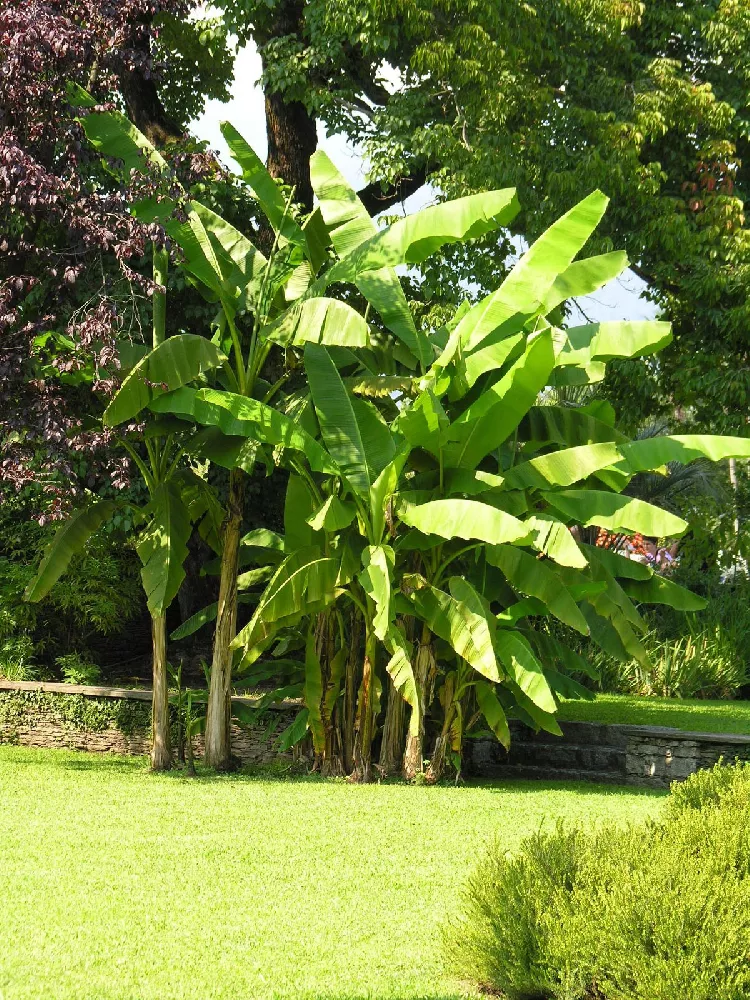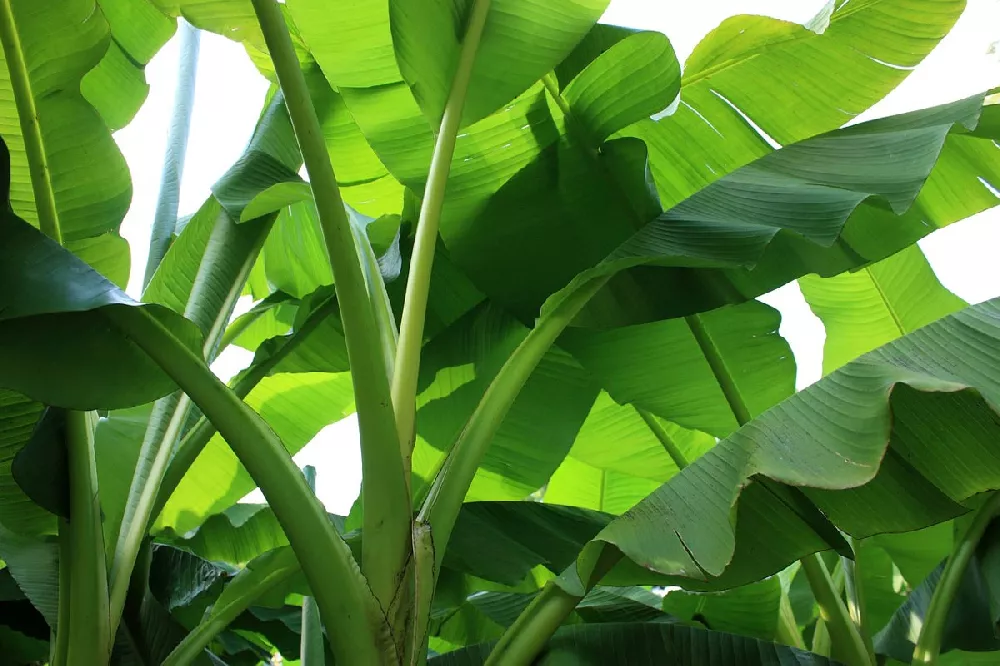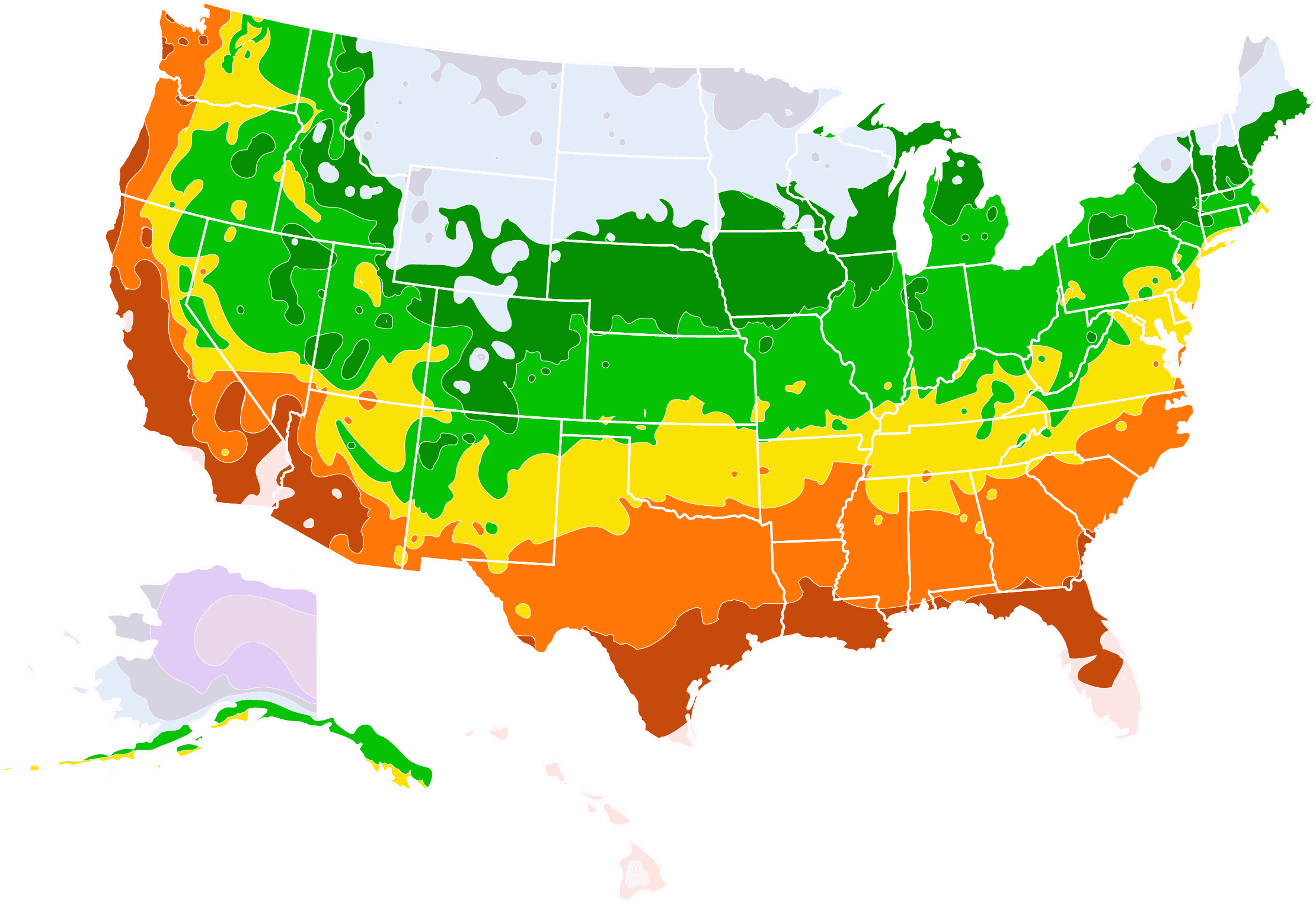- Home >
- Ornamental Trees >
- Veranda Banana Tree
Veranda Banana Tree for Sale - Buying & Growing Guide
The Veranda Banana Tree offers some of the most flavorful bananas that you can eat. These bananas also arrive in large quantities, and often you'll get about 50 pounds of bananas or more during a single harvest. Along with being a valuable edible plant, the Veranda Banana Tree, or Musa acuminata 'Veranda,' is also a very beautiful plant with large, broad leaves that create a distinctly tropical feel for your garden.
- Veranda Bananas have a fantastic taste that can compete with any other banana.
- Veranda Banana trees are highly productive, at times producing 50 pounds of bananas.
- The Veranda Banana Tree also has large, beautiful leaves.
Enter your zip code to find nearby stores that may carry this plant.
Plant Care
Sunlight

The Veranda Banana Tree requires at least six hours of direct sunlight per day.
Watering
Water this plant about once per week or more if needed throughout most of the growing season.
Fertilizing

For the best results, fertilize your Veranda Banana Tree about once per month throughout the growing season.
Planting and Care
Planting instructions
If you live in hardiness zone nine or warmer, you can grow your Veranda Banana Tree outdoors year-round with no issue. However, if you live in a cooler region, you will need to plant your Verana Banana Tree in a container so that you can overwinter it when the temperature drops below 30 degrees Fahrenheit. If you choose that route, be sure to use a large container to give your plant’s roots a chance to spread. Your Veranda Banana Tree should grow where there is full sunlight and should live in soil that has great drainage.
Watering and nutrients
Typically, you will need to water your Veranda Banana Tree about once per week during most of the growing season. In summer, you may need to increase that rate to about two to three times per week. During late fall and winter, you can reduce your watering schedule drastically to about once per month. The best way to tell if your Veranda Banana Tree needs water during the growing season is to feel if the first two inches of soil have dried out. If so, provide enough water to moisten the soil once again.
Pollination
The fruit production process for banana plants, including the Veranda Banana, is unlike that of nearly any other fruiting plant. Amazingly, banana trees do not require pollination as their unique flowers develop fruits on their own. In fact, pollination should be discouraged for this plant as pollinated bananas are often less fleshy with larger seeds, making them far less desirable to eat. As long as your Veranda Banana Tree is healthy, it will produce a large harvest in the complete absence of pollination.
Pruning
Another interesting fact about banana plants is that each of these plant’s stalks will produce a harvest only once. As such, it is best to cut the stalk back to the ground following a successful harvest. Cutting the stalk to the ground will prompt your Veranda Banana Tree to produce a new stalk that is capable of developing another set of fruits. Beyond that, pruning needs for the Veranda Banana Tree are quite low. All you should do is look for leaves that are clearly dead and cut them off at their base.
Pests, diseases and animals
There are a few pest and disease issues that can be relatively common for banana plants. Root rot, powdery mildew and similar infections are some of the most common and often arise when this plant lives in poorly drained soils or a location that lacks sunlight. Fortunately, the Veranda Banana Tree has excellent resistance to both pests and diseases. Since many people grow this plant indoors for at least part of the year, where pests are usually less prevalent, the risk of infestation will be even lower.
Harvesting
Each individual stalk of your Veranda Banana Tree will produce a single bunch of bananas. There are a few signs that indicate when this bunch will be ready to pick. One of the most trustworthy signs that harvest is near is if the small flowers at the end of each banana have dried out entirely and have become very easy for you to rub off with your fingers. When harvest time arrives, you should not remove individual bananas. Instead, you should cut off the entire banana bunch at one time.
Achieving maximum results
Since most gardeners in the United States will need to grow their Veranda Banana trees indoors for at least part of the year, it is crucial to understand how to set the ideal indoor growing conditions for this plant. Most importantly, you must position your plant in an indoor area that receives as much bright light per day as possible. However, you should also be wary of leaf scorch if your plant is too close to a window. Ensuring the air in your home is not too dry will also benefit your Veranda Banana Tree greatly.
FAQs
How long does it take a banana plant to produce fruits?
The amount of time it takes a banana plant to produce fruit can vary depending on growing conditions and the specific type of banana plant that you grow. However, generally, these plants take about 10 to 14 months to emerge from the ground and develop harvestable fruits. After harvest, you can cut down this plant's stalk and start the process again. At that rate, you'll enjoy a banana harvest about once per year.
How cold is too cold for the Veranda Banana Tree?
Technically speaking, the Veranda Banana Tree can survive temperatures that dip down to about 30 degrees Fahrenheit, which is a bit colder than what most banana plants can withstand. However, you should not allow your plant to experience such low temperatures often. In fact, it is more sensible to begin overwintering your Veranda Banana Tree once the outdoor temperatures drop to about 50 degrees Fahrenheit.
How tall is the Veranda Banana Tree?
At its tallest, the Veranda Banana Tree will be about eight feet tall. This small statue makes it very easy to plant this cultivar in a smaller garden bed or in a container. This short height also allows gardeners to place this plant in most normal-sized rooms. The main stalk and a large set of tropical leaves will account for nearly all of this plant's mature size.
Compare Similar Products
You can't add more Product Name - Product size to the cart.
OK









